David K
Honored Nomad
        
Posts: 65453
Registered: 8-30-2002
Location: San Diego County
Member Is Offline
Mood: Have Baja Fever
|
|
Let's go back in time, with a walk on EL CAMINO REAL
The Royal Road or King's Highway existed anywhere in Spanish territory as a means of communication between presidios. Presidios were a garrison,
especially a fortress of the kind established in the New World by the Spanish to protect their holdings and missions.
The Royal Roads were used to bring revenues back to Spain, when wealth was found. In California, the first 17 missions were constructed by the Jesuits
from 1697-1767 with roads to connect them and their satellite communities and 'visita' chapels. The Jesuits simply called them 'roads' and it wasn't
until after they were removed was the term 'Camino Real' seen applied frequently in writings. Perhaps this made it clear that these all were for the
King, and not the Jesuit Order, who occupied the California peninsula with great independence from the Spanish government.
The Jesuits built well, first using soldiers assigned to protect them, then with neophyte labor, provided in exchange for food and blessings. The
Jesuit roads are still visible in many sections, specially between San Javier and San Borja were the elements or modern construction and auto road
haven't obliterated it. The Jesuit roads often were built straight as arrows across the desert or valleys and had well engineered switchback up steep
mountainsides. These are easily seen on Google Earth or other satellite maps.
North of San Borja is very little visible road work and where it is seen, it is no different than a cattle trail. This is because the Jesuits were
removed from their missions just a year after they built at Calamajue and later Santa Maria... the final mission sites north of San Borja. There was
no time for the well engineered construction to take place!
The Franciscans arrived and with only a few exceptions (near Santa Maria) were not compelled to build roads in the style as the Jesuits. Prehistoric
Indian trails that connected water holes and streams were all that was required.
The Dominicans (1773-1849) who replaced the Franciscans on the peninsula also were fine with the existing or single track trails. Some mission trail
construction can be seen between the visita of San Isidoro and the mission of San Pedro Martir. Otherwise, the Camino Real simple took the easiest
route between water and mission sites.
After the United States acquired Alta California in 1848, maps began to be made, and the Camino Real from the new border north to Sonoma was the main
road and soon became a stage coach road and eventually automobiles began using the route after road building. Highway 101 is close to the original
route and in San Diego and other counties, paved streets and multi-lane boulevards are built upon it and given its name.
In Baja California, much of El Camino Real is in the mountains where water is found, and automobile roads needed to use other routes. However, from El
Rosario north to the U.S. border, Highway One is parallel, on top of of not far from the original route to San Diego.
Arthur North was the first 'modern tourist' to travel the Camino Real in Baja beginning in 1905. His 1910 'Camp and Camino in Lower California' is an
excellent read of the era.
Marquis McDonald and companion took a Willys Jeep in 1949-50 and also rode mules to visit all the missions he had read about, many years later
publishing his 1968 'Baja: Land of Lost Missions'.
Howard Gulick traveled all of Baja roads in the 1950s to write the Lower California Guidebook with the first good and complete maps of the roads in
Baja. Gulick made notes whenever he saw the old mission road and even hiked or road mules to document El Camino Real. Gulick had a set of notes and
maps that were not published, but of great value to the most well known modern Camino Real traveler, Harry Crosby.
Crosby first traveled the Camino Real as a photographer for a new book, 'The Call to California', made to celebrate bicentennial of the founding of
the San Diego mission by Junipero Serra in 1769.
In 1974, Harry Crosby returned to write 'The King's Highway in Baja California' documenting his mule ride from Comondu to nearly San Fernando de
Velicata (he was not able to secure mules in Loreto or San Javier to begin at the beginning!).
In 1977, Harry commissioned detailed maps made of the Camino Real, based on research done by him. They were published in the Journal of San Diego
History, Winter 1977 and are also on the Internet along with Crosby's details about El Camino Real.
In 2003, Harry Crosby wrote a highly detailed book on the route of Junipero Serra from San Fernando de Velicata to San Diego, completing the route in
detail that started with the King's Highway in Baja California. The new book was called 'Gateway to Alta California' and is quite amazing.
Baja Nomad member 'Baja Bucko' has been riding mules on the Camino Real and other mission trails since 2001, and I look forward someday to read more
from her!
More to come... in the meantime...
Here's a look at Hoawrd Gulick's 1954 Camino Real maps:
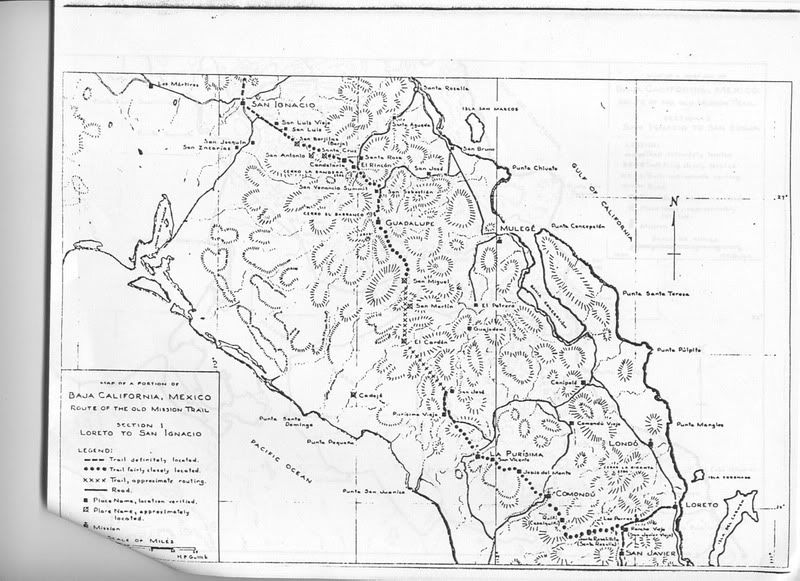
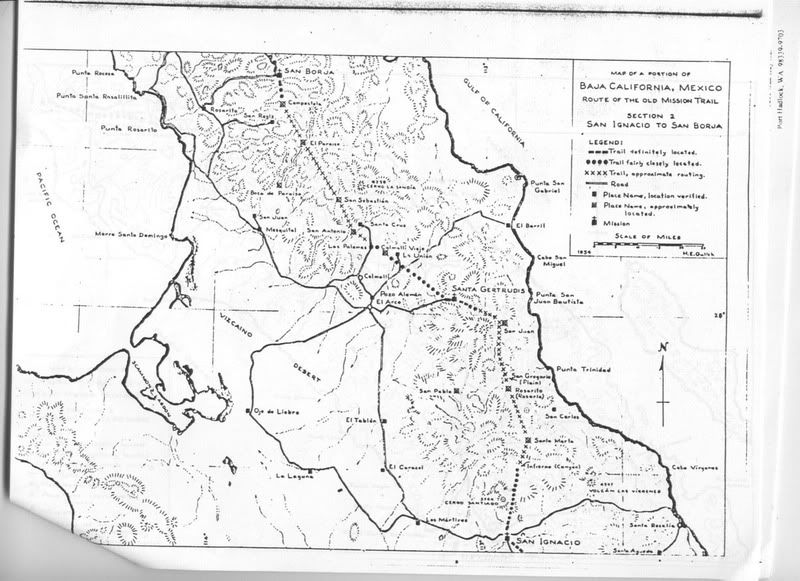
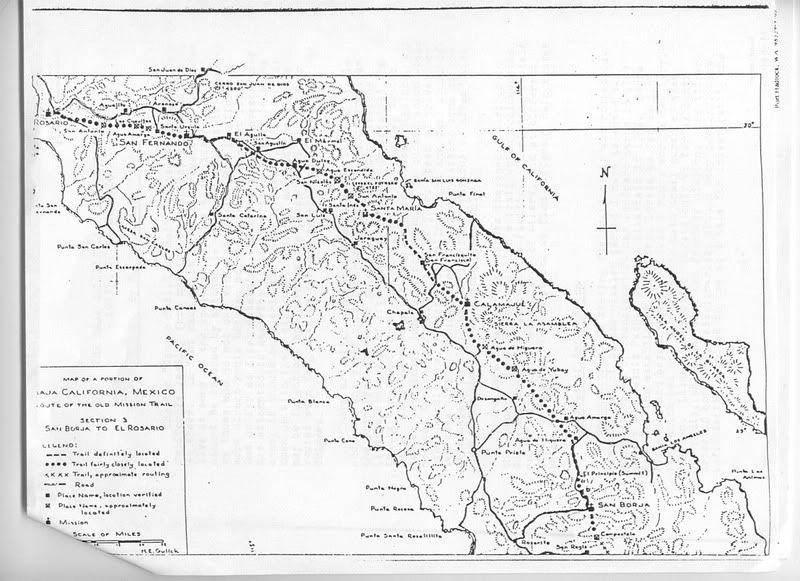
---------------------------------------------------------------------------------------------
Here are the Crosby 1977 Camino Real maps (south to north):
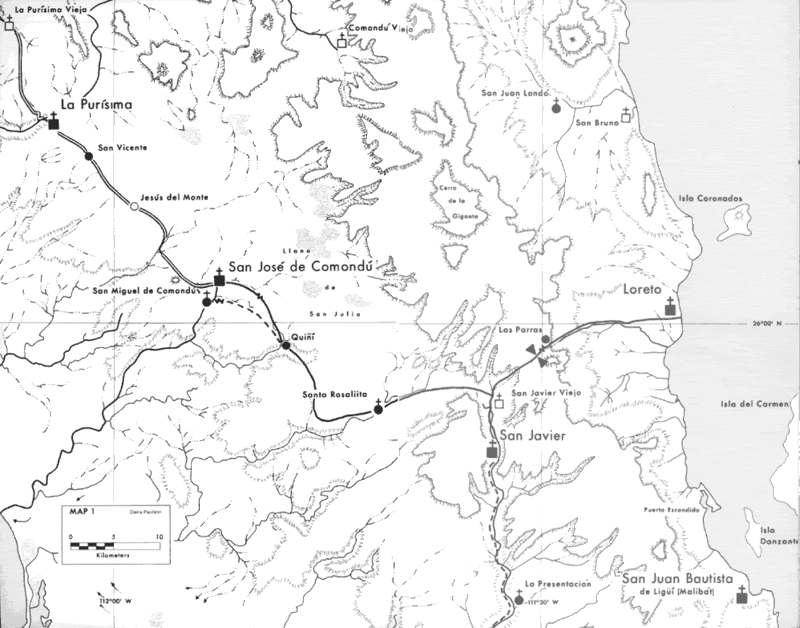
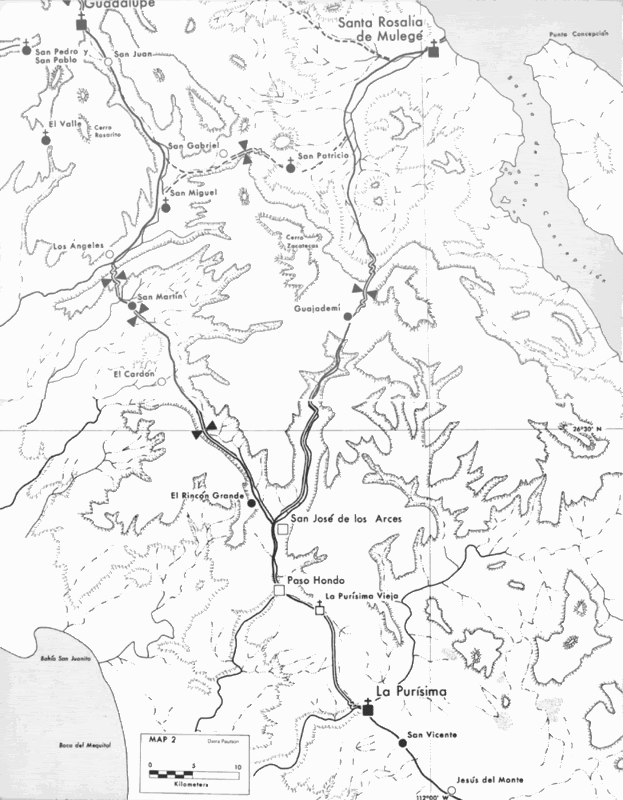
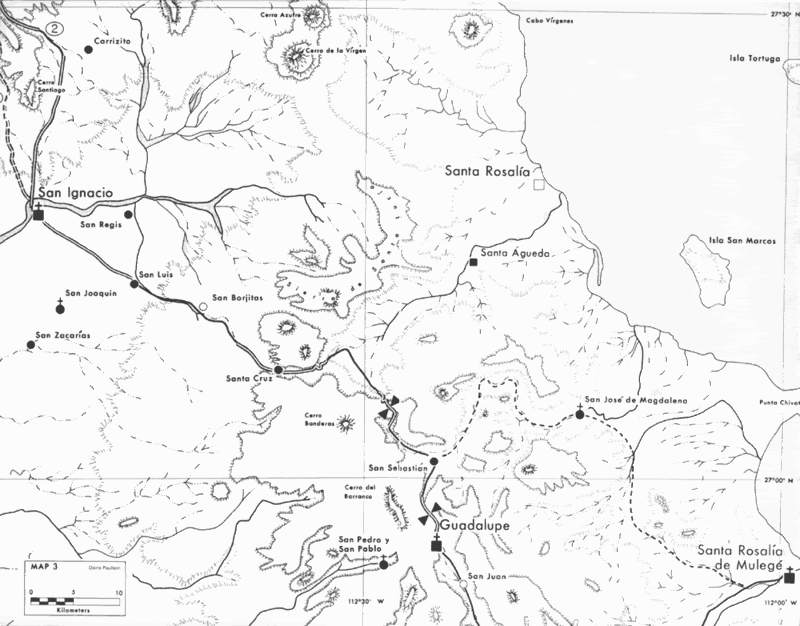
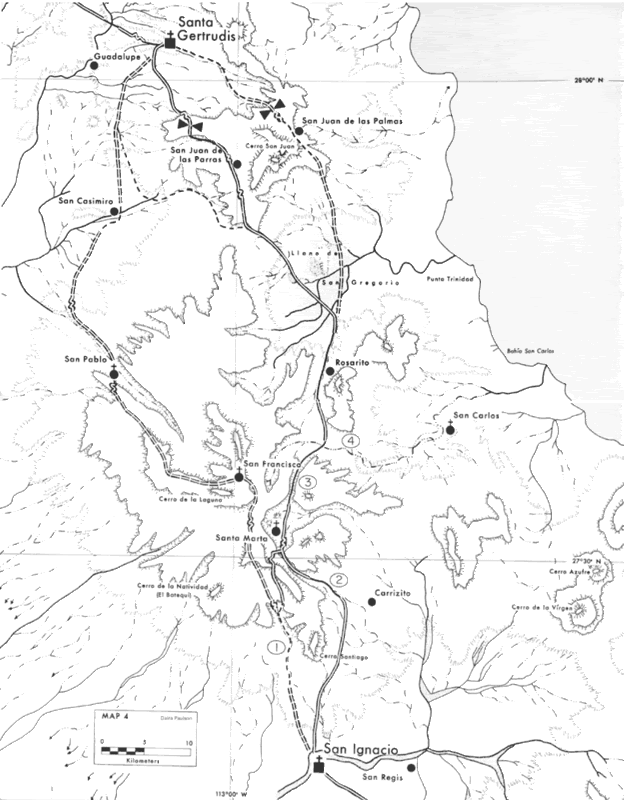
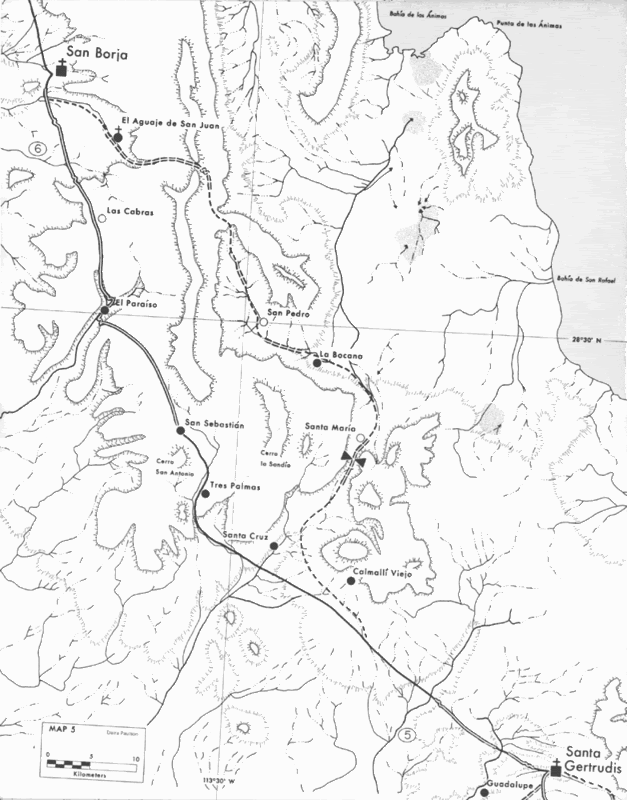
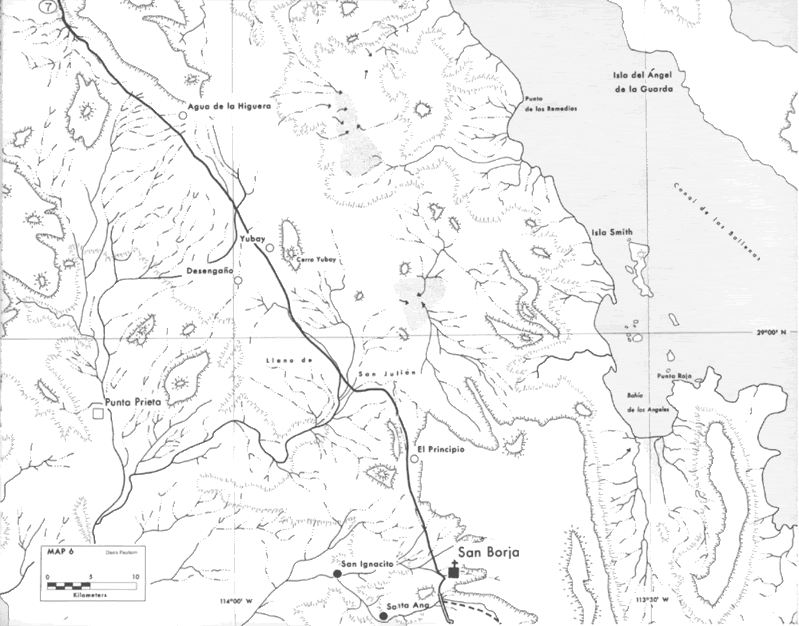
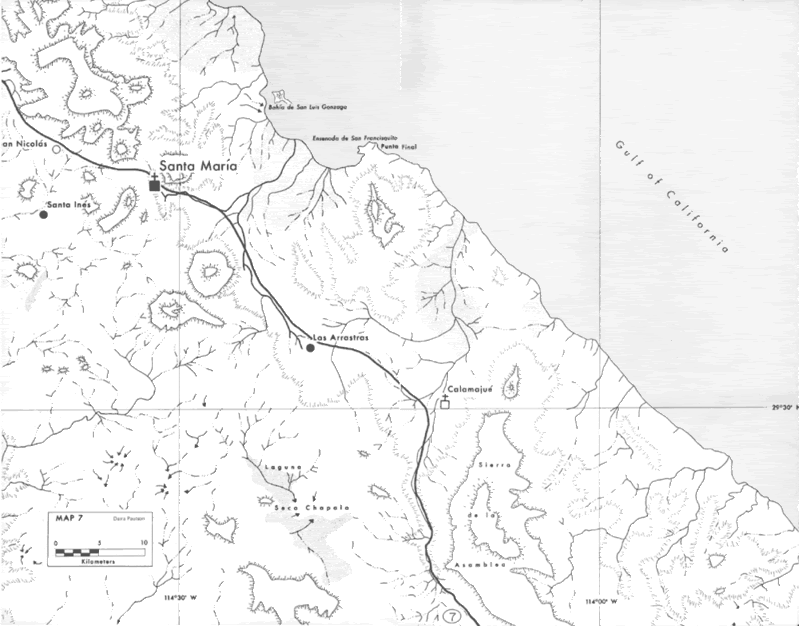
More at: http://www.sandiegohistory.org/journal/77winter/bajamaps.htm
Links to where on Baja Nomad I have posted satellite photos and maps of the Camino Real from Santa Maria back to Loreto are on this page: http://vivabaja.com/missions2/page13.html
More to come.... stay tuned!
|
|
|
David K
Honored Nomad
        
Posts: 65453
Registered: 8-30-2002
Location: San Diego County
Member Is Offline
Mood: Have Baja Fever
|
|
On El Camino Real
Before Kilometer Markers....
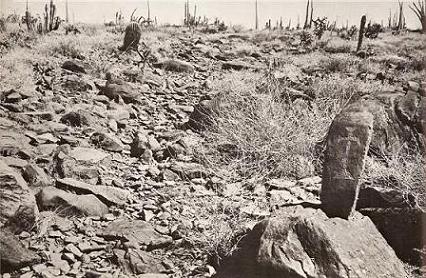
|
|
|
David K
Honored Nomad
        
Posts: 65453
Registered: 8-30-2002
Location: San Diego County
Member Is Offline
Mood: Have Baja Fever
|
|
Neal Johns survey's the marker he made for the Jesuits in 1762!
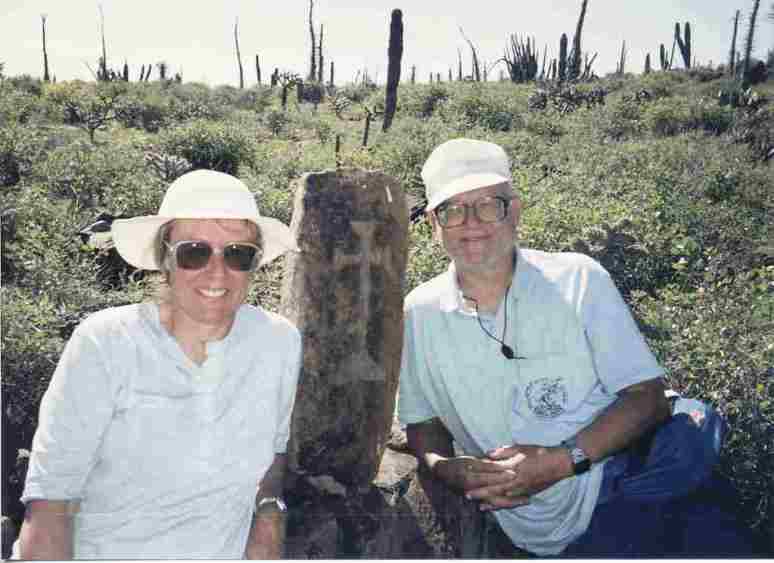
|
|
|
Neal Johns
Super Nomad
   
Posts: 1687
Registered: 10-31-2002
Location: Lytle Creek, CA
Member Is Offline
Mood: In love!
|
|
Father Johns is watching you.........
My motto:
Never let a Dragon pass by without pulling its tail!
|
|
|
David K
Honored Nomad
        
Posts: 65453
Registered: 8-30-2002
Location: San Diego County
Member Is Offline
Mood: Have Baja Fever
|
|
Those who enjoy novels based on real places, people or events should enjoy 'Journey of the Flame'..
Here is Amazon's brief description of the story, and about the author:
--------------------------------------------------------------------------------------------------------------
A slow ride through exotic territory
On the night of his 104th birthday, Don Juan Obrigon--tall and straight, with hair still flaming red--prepares to tell his life story to assembled
relatives and guests. The story he will tell describes his travels as a boy of twelve in 1810, when he accompanied the Spanish viceroy of Baja
California from the southern tip of Baja California to Monterey.
The Journey of the Flame is that rare treasure, an artfully imagined work of fiction that is based on meticulous research and brings life to the study
of history. Here are the manners, textures, and tones of Spanish California, transcending all stereotypes. A slow ride through exotic territory the
book is rich in leisurely pacing and dense detail that truly capture another time and reveal another world.
Considered a masterpiece of California literature by an entire generation of historians, geographers, and literary critics, The Journey of the Flame
has been long out of print but is now available in a new and beautifully designed California Legacy edition.
---------------------------------------------------------------------------------------------------------
About the Author
Walter Nordhoff (1855-1937) had a mining engineering degree from Yale and worked as a European correspondent for the New York Herald before moving
west to manage fifty thousand acres of his father's land in Baja California, the area that inspired The Journey of the Flame. Nordhoff's father,
Charles, was also a writer, whose work includes travel guides, books on religion and slavery, and most notably the Mutiny on the Bounty trilogy of
adventure novels.
|
|
|
Neal Johns
Super Nomad
   
Posts: 1687
Registered: 10-31-2002
Location: Lytle Creek, CA
Member Is Offline
Mood: In love!
|
|
Walter Nordhoff kept it a secret that he was the author for many years, but finally it was weaseled out or him. A great book and an educational one re
the El Camino Real.
About DK's alleged picture of me on the ECR, that was my grandparents.
Neal "Trust Me" Johns
My motto:
Never let a Dragon pass by without pulling its tail!
|
|
|
David K
Honored Nomad
        
Posts: 65453
Registered: 8-30-2002
Location: San Diego County
Member Is Offline
Mood: Have Baja Fever
|
|
I have a 1933 edition authored by 'Fierro Blanco', Walter Nordolff's pen name (or pseudonym).
Mark Twain was Samuel Clemens.. and the creator of the "boojum", Lewis Carroll was Charles Dodgson!
Here is the Journey of The Flame route map! c1933:
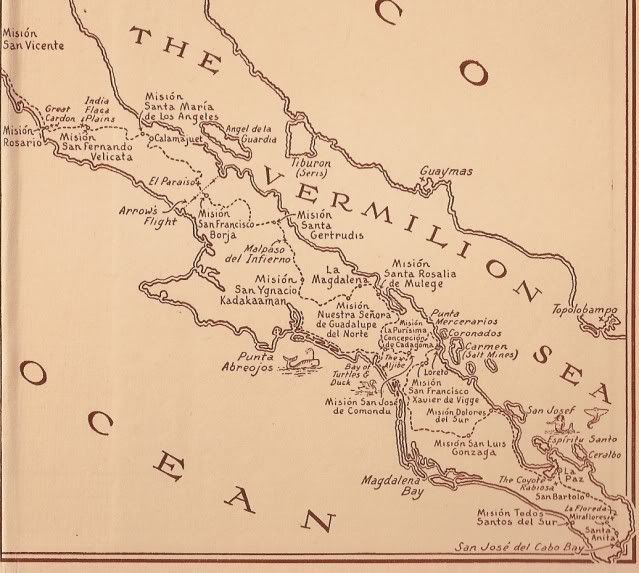
|
|
|
David K
Honored Nomad
        
Posts: 65453
Registered: 8-30-2002
Location: San Diego County
Member Is Offline
Mood: Have Baja Fever
|
|
In 2018, we have a new resource for finding El Camino Real between Loreto and El Rosario, using Google Earth, thanks to 20 years of hiking and
confirming original mission routes from more modern trails: www.caminorealbaja.com
|
|
|
BajaBlanca
Select Nomad
      
Posts: 13247
Registered: 10-28-2008
Location: La Bocana, BCS
Member Is Offline
|
|
So incredible to see Punta Abreojos on the map but not La Bocana, which is only 70 years old!
|
|
|
David K
Honored Nomad
        
Posts: 65453
Registered: 8-30-2002
Location: San Diego County
Member Is Offline
Mood: Have Baja Fever
|
|
I think it is the point and not the town that puts it on the map. It was a dangerous place to sailors. Abreojos means OPEN your EYES!
|
|
|
rts551
Elite Nomad
     
Posts: 6700
Registered: 9-5-2003
Member Is Offline
|
|
Punta Abreojos was named by Francisco de Bolaños in the 1540's because of its many reefs. The town was not established until the 1920's...The
lighthouse above town was built in the 30's.
|
|
|
fishbuck
Banned
Posts: 5318
Registered: 8-31-2006
Member Is Offline
|
|
Thanks DK. This is cool!
"A ship in harbor is safe, but that is not what ships are built for." J. A. Shedd.
A clever person solves a problem. A wise person avoids it. – Albert Einstein
"Life's a Beach... and then you Fly!" Fishbuck
|
|
|
David K
Honored Nomad
        
Posts: 65453
Registered: 8-30-2002
Location: San Diego County
Member Is Offline
Mood: Have Baja Fever
|
|
When do you want to fly over it?   
|
|
|
fishbuck
Banned
Posts: 5318
Registered: 8-31-2006
Member Is Offline
|
|
As soon as possible!
"A ship in harbor is safe, but that is not what ships are built for." J. A. Shedd.
A clever person solves a problem. A wise person avoids it. – Albert Einstein
"Life's a Beach... and then you Fly!" Fishbuck
|
|
|

